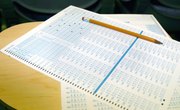Parents typically voice several reasons for choosing to enroll their children in private school. One of the most commonly cited factors is smaller class sizes that ensure a greater degree of individual attention than in public schools. Another consideration is the higher level of academic performance that private schools expect from students. Private schools also promote moral values and discipline through codes of conduct that define education as a privilege, not a right.
Academic Excellence
Private schools enjoy a reputation for academic excellence in many communities. For example, a January 2013 "Dayton Daily News" study found that 13 private high schools in the area had better college admissions test scores than their public school peers, though the latter systems recorded higher individual averages. The private schools scored a 23.6 composite average on the American College Test, versus 21.7 for the nine-county region's 81 public high schools, the newspaper found.
Controlled Class Sizes
Controlling class size is a defining characteristic of many private schools. A 2002 U.S. Department of Education report showed private schools averaging 13 students per full-time equivalent teacher, versus 16 students per teacher in public schools. Thirty-six percent of private schools averaged student-teacher ratios of 10:1 or lower, compared to 10 percent for public schools. As a result of smaller class sizes, teachers can spend more time ensuring that students understand the material.
Emphasis on Discipline
For the parents who choose them, private schools offer a more consistent approach to student discipline than public schools. "Private School Review" states that as a condition of enrollment, private schools require incoming students to show they've read and understood the conduct code. The actual method of discipline depends on the contract terms although many private schools impose zero-tolerance policies for such major behavioral offenses as cheating, stealing or substance abuse. Flouting these policies means immediate expulsion unlike in public school systems.
Higher Standards
Graduation requirements and coursework levels are notably higher at private schools, according to the U.S. Department of Education study. The study found that private schools required an average of 3.1 years of math and 1.5 years of foreign languages, versus 2.7 and 0.5 years for public schools, respectively. In another notable trend, about 40 percent of private schools required some form of community service for students to graduate, versus 10 percent for public schools.
Individual Attention
Smaller enrollment and staff allow private schools to focus on every aspect of students' lives. Massachusetts public schools, for example, average one counselor for every 415 students, versus a 5:1 ratio at many private schools, Boston.com reported in 2004. As a result, private school counselors can focus on helping students academically, particularly those going to college. Many private school counselors worked in college admissions offices, the newspaper notes, giving them additional insight into the process.
Related Articles
References
Resources
Writer Bio
Ralph Heibutzki's articles have appeared in the "All Music Guide," "Goldmine," "Guitar Player" and "Vintage Guitar." He is also the author of "Unfinished Business: The Life & Times Of Danny Gatton," and holds a journalism degree from Michigan State University.











